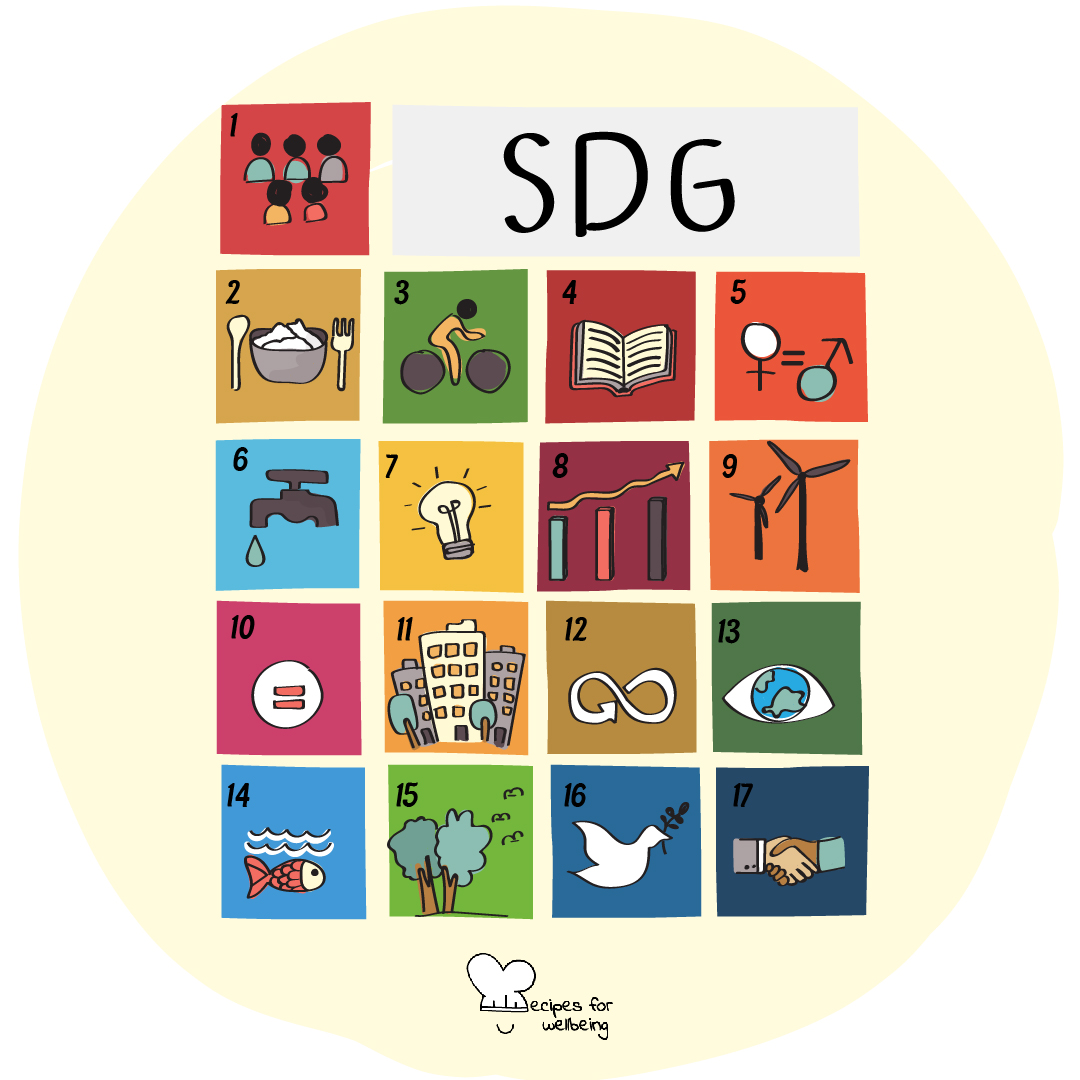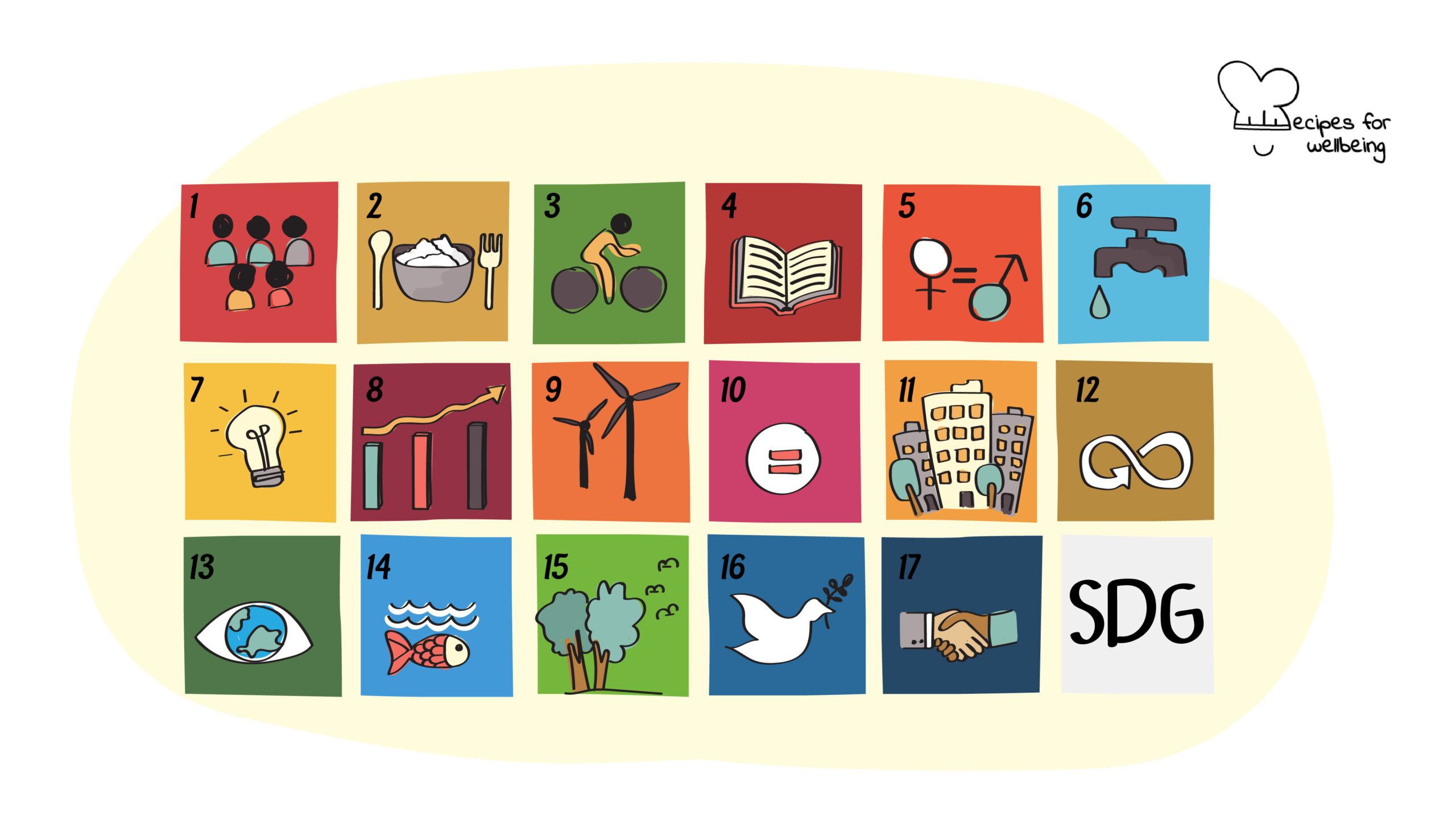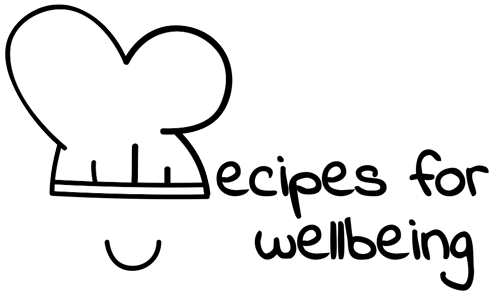
Support the Sustainable Development Goals
Small acts, when multiplied by millions of people, can transform the world. ―Howard Zinn
👥 Serves: 11-25 people, 2-10 people, 26-40 people, 41+ people
🎚 Difficulty: Medium
⏳ Total time: Ongoing
🥣 Ingredients: Teamwork and dedication
🤓 Wholebeing Domains: Accomplishments, Bioempathy, Liberatory Learning
💪 Wholebeing Skills: Ambition, Challenging, Ecosystem harmony, Flourishing, Framing, Goal-setting, Legacy, Liberation

Support the Sustainable Development Goals
📝 Description
Take action to meet the Sustainable Development Goals.
Back in 2015, all United Nations Member States adopted the 2030 Agenda for Sustainable Development as a blueprint for peace and prosperity for people and the planet. At its core are the 17 Sustainable Development Goals (SDGs), which address the global challenges we face, such as poverty, inequality, climate change, etc. and call all countries to unite for global action. With only a few years left, prompt and serious action is needed to achieve them. Find out how your organisation and/or community can join this effort!
This recipe has been inspired by the Sustainable Development Goals and has been adapted by our wellbeing content writer collaborator Marissa Del Mistro.
👣 Steps
Step 1 – Understand the goals (1 hour)
For your community and or organisation to participate in supporting the SDGs, it is important to understand what they are.
- No Poverty: End poverty in all its forms everywhere (infographic).
- Zero Hunger: End hunger, achieve food security and improved nutrition and promote sustainable agriculture (infographic).
- Good Health and Well-being: Ensure healthy lives and promote well-being for all at all ages (infographic).
- Quality Education: Ensure inclusive and equitable quality education and promote lifelong learning opportunities for all (infographic).
- Gender Equality: Achieve gender equality and empower all women and girls (infographic).
- Clean Water and Sanitation: Ensure access to water and sanitation for all (infographic).
- Affordable and Clean Energy: Ensure access to affordable, reliable, sustainable and modern energy (infographic).
- Decent Work and Economic Growth: Promote inclusive and sustainable economic growth, employment and decent work for all (infographic).
- Industry, Innovation and Infrastructure: Build resilient infrastructure, promote sustainable industrialization and foster innovation (infographic).
- Reduced Inequalities: Reduce inequality within and among countries (infographic).
- Sustainable Cities and Communities: Make cities inclusive, safe, resilient and sustainable (infographic).
- Responsible Consumption: Ensure sustainable consumption and production patterns (infographic).
- Climate Action: Take urgent action to combat climate change and its impacts (infographic).
- Life Below Water: Conserve and sustainably use the oceans, seas and marine resources (infographic).
- Life On Land: Sustainably manage forests, combat desertification, halt and reverse land degradation, half biodiversity loss (infographic).
- Peace, Justice and Strong Institutions: Promote just, peaceful and inclusive societies (infographic).
- Partnerships for the Goals: Revitalise the global partnership for sustainable development (infographic).
Each SDG has more targeted goals, which you can read in more detail here. While every goal is, of course, important, to avoid getting overwhelmed, it is good practice to select one or two that your community/organisation would like to contribute to. This may be a specific goal that aligns well with the work of your organisation or is particularly important for your community. You may also consider inviting your organisation/community to vote and let the top choices be what you focus your energy and resources on.
Step 2 – Take action (2 hours)
After deciding which goal you wish to support, you can decide on practical ways to pursue. Here are some suggestions:
- #2 – Zero Hunger: Organisations can work with their team to offer paid days off strictly for volunteering, which can be spent at soup kitchens, food banks or even home delivery services for disabled or elderly people.
- #3 Good Health and Well-being: Communities can focus on implementing and investing in incentives that work towards increasing fitness, time outside, and eating well. Organisations can work on their policies and available benefits to ensure their employers are getting sufficient wellbeing practices and good health care policies. You can get some inspiration from our recipes including “Creating the right work spaces”, which focuses on setting up your work space/offices to encourage high performance, and “Mental health in the workplace”, which includes ways to best discuss mental health in the workplace and/or “Wellbeing at work”, which includes resilient and effective wellbeing practices. There are also recipes for communities including “Genuine Wealth”, whereby the definition of wealth expands from financial to also include human, social, natural, manufactured, or physical aspects. There is also the recipe “Inspiration from Ngā Tūtohu Aotearoa” which looks beyond the economy to see what can be done to improve the wellbeing of everyone. Finally, the “Theory of Change for wellbeing” recipe to improve community wellbeing.
- #4 – Quality Education: Sponsor a school or student in need by donating money or resources such as books, notebooks, and other supplies.
- #6 Clean Water and Sanitation: Your organisation can take the WASH pledge, which aims to “implement access to safe water, sanitation, and hygiene at the workplace”
- #12 – Responsible Consumption: Shockingly, the average person creates nearly 1.2kg/2.65 lbs of waste every single day! To be responsible with consumption, focus on everyday purchases to try and reduce plastic use and aim for less food waste, while avoiding one time use products and buying second hand. One way to do this is with “The no-spend challenge” recipe, which is where you do not spend any money for an entire week to support minimalism and sustainability.
- # 13 – Life on Land: Ensure recycling, reducing, and reusing is a priority and an option. Both communities and organisations can incitive these practices by having an accessible way to partake. Some easy examples include changing a cooler for a water fountain, encouraging car-pooling, or offering bike to work incentives. Communities can work on car-free zones or free buses a few times a month. You can also arrange regular group clean-ups of riverbanks, highways, or other areas that need some attention.
Whatever goals you choose to prioritise, know that every little step matters! Sometimes, actions can feel wasted or so subtle you think to yourself, is this going to make a difference? The answer is: yes! More people working in tandem will contribute to more visible progress and change.

